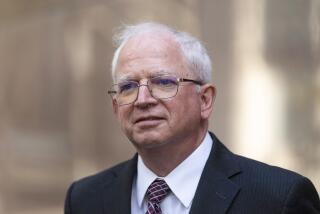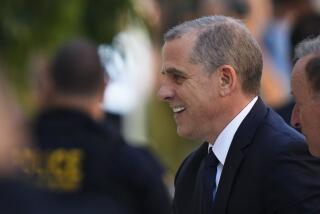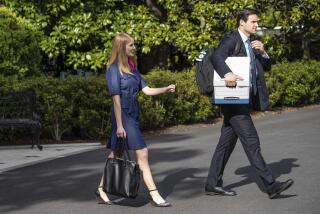Deaver Pleads Innocent to Five Perjury Counts
- Share via
WASHINGTON — Former presidential aide Michael K. Deaver, indicted by a federal grand jury last week, pleaded innocent Thursday to five counts of lying under oath about his post-government lobbying activities.
“I am not guilty, your honor,” Deaver said in a firm voice, flanked by defense attorneys Herbert J. Miller Jr. and Randall J. Turk.
U.S. District Judge Thomas Penfield Jackson set a trial date of June 8. He said he first would rule on expected motions by Deaver’s lawyers challenging the legality of the indictment on grounds that independent counsel Whitney North Seymour Jr. lacked constitutional authority to prosecute him.
Jackson earlier this month dismissed those arguments as premature, since Deaver had not yet been indicted, and a panel of appellate judges as well as Supreme Court Chief Justice William H. Rehnquist took the same position.
Challenge Planned
Miller told reporters that he will file at least two motions attacking the indictment before April 20, the deadline set by Jackson. One will assert that there is insufficient evidence for the charges and the other will challenge Seymour’s appointment as unconstitutional, Miller said.
Deaver’s lawyers contend that the 1978 Ethics in Government Act, under which Seymour was appointed by a special federal judicial panel, improperly usurps the executive branch’s exclusive constitutional authority to conduct prosecutions.
Jackson, while refusing to address that issue until an indictment was returned, did say that he thought the validity of the act eventually would be upheld.
The charges against Deaver have stirred controversy in the legal community because they do not allege that Deaver violated federal conflict-of-interest statutes in his lobbying business, the focus of the investigation. They comprise two counts of perjury stemming from his testimony before a congressional committee and three counts of false declarations to a federal grand jury.
Ethics Provisions
Although Seymour has refused to comment, some attorneys say he apparently believes the federal ethics provisions are cloudy and inexact, allowing loopholes that would have made prosecution on such laws difficult.
However, one attorney with knowledge of Seymour’s thinking said that Seymour, while steering around the complexities of conflict-of-interest charges, may have made the perjury prosecution vulnerable to arguments by Deaver that he had no motive for lying because he was not in violation of any ethics statutes.
One obstacle in a conflict-of-interest case, attorneys say, is that Deaver allegedly lobbied officials who worked for related presidential agencies such as the budget office and the National Security Council, rather than the White House staff itself, where Deaver was deputy chief of staff before he resigned in May, 1985.
The ethics law generally prohibits a former government official from lobbying his old colleagues on behalf of business clients for his first 12 months out of office. The prohibition is for longer periods when it involves matters in which the ex-official had personal involvement.
Deaver Fingerprinted
Deaver left the federal courthouse without comment after his arraignment and went to an FBI field office for routine fingerprinting and photographing. His attorneys have said that publicity over the nine-month-long investigation has caused most of his former clients to cease doing business with his public relations firm, Michael K. Deaver & Associates, which once had billings of $4.5 million annually.
Deaver said in a statement last week that the allegations against him are “groundless” and that he will be cleared of all wrongdoing at trial, “if the case gets that far.”
If convicted on all the counts, Deaver could face a maximum punishment of 25 years in prison and $34,000 in fines.
More to Read
Sign up for Essential California
The most important California stories and recommendations in your inbox every morning.
You may occasionally receive promotional content from the Los Angeles Times.













